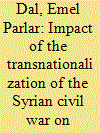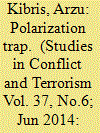| Srl | Item |
| 1 |
ID:
153883


|
|
|
|
|
| Summary/Abstract |
This article examines how Turkey was affected by the conflict spillover effects of the Syrian civil war and its escalation in the last two years with the rise of the Islamic State in Iraq and Syria (ISIS) threat and the changing nature of the Kurdish insurgency. It seeks to assess the degree of the transnationalization of the Syrian civil war and its spread to Turkey by employing a theoretical framework borrowed from the conflict clustering literature. The first part will introduce the dual-embedded theoretical framework with its division of conflict spillover effects as “intentional” and “unintentional”. The second part tries to apply this dual-track framework to the Turkish case and, thus, seeks to test the conflict spillover factors on Turkey. The third part focuses on the two specific and major spillovers of the Syrian civil war, the ISIS threat and the rise of an embedded Kurdish insurgency, namely Democratic Union Party (PYD or Partiya Yekîtiya Demokrat)-Peoples Protection Units (Yekîneyên Parastina Gel or YPG)/Kurdistan Workers Party (Partiya Karkerên Kurdistanê or PKK), and explains the conflict spillover processes of these two case studies under a triple framework, origin, diffusion and escalation and with reference to the division between intentional and unintentional spillover effects.
|
|
|
|
|
|
|
|
|
|
|
|
|
|
|
|
| 2 |
ID:
132200


|
|
|
|
|
| Publication |
2014.
|
| Summary/Abstract |
This article studies the association between ethnic conflicts and political attitudes. It employs a new data set on the casualties of the ethnic conflict in Turkey to identify the effects of the Kurdish insurgency on the electoral behavior of the Turkish voters. The results indicate that the conflict leads to the political polarization of the society along ethnic nationalist lines. Further investigation of the data also provides some empirical support for the constructivist argument that the salience of ethnic identities is subject to change in response to external stimuli, of which ethnic conflict constitutes a drastic example.
|
|
|
|
|
|
|
|
|
|
|
|
|
|
|
|
| 3 |
ID:
121471


|
|
|
|
|
| Publication |
2013.
|
| Summary/Abstract |
The article addresses the issues involved in Turkey's watchful neutrality vis-á-vis the Kurdish mobilization and the temporary autonomy deal in Iraq during the 1970s. Regardless of Ankara's long-held concerns about the spillover effects of the cross-border ethnic issues and growing outside assistance to the Kurdish insurgency by the US, Iran and Israel against Baghdad, Turkey stood aloof to the internationalisation of the Kurdish developments in Iraq. The successive governments in Turkey generally saw the Kurdish-Baghdad confrontation throughout the 1960s and early 1970s in the context of the Cold war and therefore were able to overlook its possible implications on its own Kurds, especially in view of the assurances extended to itself by its allies involved. Having no acute perception of vulnerability due to international conjuncture, the relations with the allies and domestic politics, Turkey seemed not to have any particular instrumental, affective or humanitarian motives to actively get involved in the then significant Kurdish developments in Iraq.
|
|
|
|
|
|
|
|
|
|
|
|
|
|
|
|